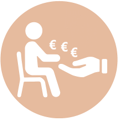Book a tip

This chapter is about recording tips with the cash register system. This is particularly necessary from a legal point of view when tips are also paid without cash.
No tax or legal advice

The following information is for general guidance only and does not constitute tax or legal advice.
Hypersoft is not authorised to do this.
Please check the contents carefully and, if necessary, consult with your tax advisor or another competent person to ensure that your approach complies with the applicable legal and tax requirements.
If necessary, adapt our advice to your individual circumstances and record the results in your procedural documentation.
Best practice: Booking tips - correct, secure, tax-compliant
Tips are an integral part of everyday catering - and at the same time a sensitive topic in the interplay between tax law, billing security and employee motivation.
Our advice: Book tips consistently in the POS system.
The Hypersoft system offers special functions and automatisms that enable a clean separation of sales and tips - including support for tax-free tip bookings in accordance with §3 no. 51 EStG.
Why tips should always be booked:
-
Non-accountable tips lead to uncertainties - for example, in the cash register or the accrual of revenue.
-
Tips that are not booked can distort the accounting - for example, if they are mixed with sales amounts.
-
Tax risks arise if the scope is not correctly documented.
Danger from "tip fraud"

A common misuse: Operators waive the billing of individual items - in exchange for a higher personal tip. This behaviour doesn't just happen to be common where you are on holiday - it may also happen in your own company. And not necessarily out of malice, but because subtle favours and uncontrolled leeway can quickly creep in:
"I'll let that pass - the guest tips well."
But there is only one thing that helps here: generosity with a system - and control with a concept. Tipping is not the enemy - but it must not become a gateway for abuse. Instead, give your employees defined freedoms to inspire guests - with clear agreements and documentation.
Further topics: Best practice: Protection against "false invitations"
The problem:
-
This results in a loss of sales that is no longer noticeable.
-
The distribution of tips becomes non-transparent - honest employees see themselves at a disadvantage.
-
Guests get used to special treatments that do not match the brand image.
Control instead of mistrust
A modern POS system such as Hypersoft enables you to record tips automatically, traceably and in compliance with tax regulations - without additional work for the team.
The integrated analyses of tips also provide a fair basis for comparing team performance, service quality or motivation models.
Hypersoft supports two approaches:
-
Tax-free tips (e.g. for cash payments, direct gratuity)
-
Taxed tips (e.g. via credit card, pool regulation or payroll accounting)
Both variants can be flexibly mapped in the system - including corresponding labelling and processing in reports and exports.
Conclusion:
Tipping is more than just a bonus - it is part of your overall business concept. If you map it properly, you protect yourself against fraud, strengthen team spirit and stay on the safe side during audits.
Further topics: Directory: Best Practice
Tabular overview of the tipping functions
| Tip function | Hypersoft POS | Hypersoft mPOS | Tax-free | Taxed |
| Book tipping items manually | yes | yes | yes | no |
| Book item as a taxed tip | yes | yes | no | yes |
| Tipping by overpayment with connected (EC-) card device | yes | yes | yes | no |
| Subsequent tip at the POS | yes | - | yes | no |
| Tip query for overpayment at POS and mPOS | yes | yes | yes | no |
| Expenses and tips in PMS | yes | yes | yes | no |
| Percentage tip | yes | yes | no | |
| Tipping in reports | - | yes | no | |
| Evaluate taxed tips | - | no | yes | |
| NoCOO Tip | - | - | yes | manual posting |
| Webshop Tip | - | - | yes | manual posting |
| NoCOO Online Payment Tip | - | - | yes | no |
|
eSolutions |
|
|
|
|
| Record tips with eSolutions API | - | - | adjustable | adjustable |
| In House Order Tip | Influences control | Influences control | depending on operation responsibility | depending on operation responsibility |
Make sure that your staff are fully trained and follow the instructions in HypersoftHypersoft procedure with tip bookings.
Best practice: Cash shortage through cashless tips
With the increase in cashless payments, a new problem has arisen in many businesses: there is no cash to pay the tip to the team at the end of the day - even though it was given digitally during the payment process.
Why this is tricky
As a rule, tips are only tax-free if they are given directly and voluntarily by the guest to the operator - and not via the business. As soon as you collect and pass on digital tips as a business, you risk losing your tax exemption. What was once intended as protection against tricky proprietors ("we call everything a tip") now jeopardises the honest employees who count on their tax-free wage component.
✅ Our recommendation

Always pay tips immediately in cash. If your cash register does not contain enough cash in the evening to pay out the collected (digital) tips to the operators: withdraw cash from the business account and use a separate cash balance such as "Office cash balance" or "Vault cash balance". This way, the process is correctly documented - but the tip remains separate from the business.
Legal and practical information
Only document the cash movement, not the tip amount itself. From a tax perspective, the tip remains with the operator.
No payment via payroll or as a business expense - this would be subject to income tax.
Make a clear distinction between sales and tips - otherwise you will not only cause tax damage, but also mistrust within the team.
Tipping is trust - in both directions
A well-organised tipping system strengthens your employee loyalty. A poorly managed one leads to disputes, uncertainty - and in the worst case to the loss of tax exemption. You'd better go for it:
✔ Transparency
✔ Immediate cash payment
✔ Clean internal processes
Further topics:
Tip information in the financial report
Best practice: using change in a structured and traceable way
Note on "compulsory charges" for tips
There are different procedures for dealing with tips, and we are increasingly coming across so-called "compulsory charges". Operators who deal with payments and tips are obliged to give a portion of their total turnover as tips to other colleagues (e.g. 5% in a full-service establishment). As a rule, a residual amount of the tip remains with the employee and the other colleagues also receive a share.
Legal aspects:
-
Tax exemption of tips: In Germany, tips are generally only tax-free if they are given voluntarily and with the direct intention of the guest and employee. Compulsory levies or flat-rate distributions can call this tax exemption into question.
-
Transit of tips through the business: Tips that pass through the business or the owner are taxable. A compulsory levy procedure could give the impression that the tips are administered by the employer, which in turn could trigger a tax liability.
-
Liability and responsibility: As the owner, you are generally liable for correct taxation. As your employees are also not interested in paying tax on tips that are actually tax-free, you should coordinate your procedures in this area with your tax advisor.
-
Procedure description: It is recommended that a clear procedure description be drawn up that specifies which parts of the tips are tax-free and which are not. Non-tax-free tips should be taxed correctly in order to avoid later conflicts with the tax authorities.
Tipping with eSolutions has been given its own chapter, please switch to the page Tipping with eSolutions.
Further topics:
Hypersoft procedure with tip bookings
Back to the overarching topic: Hypersoft POS Cash Handling